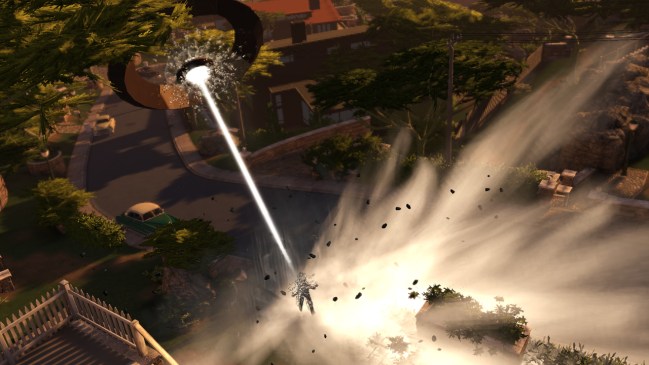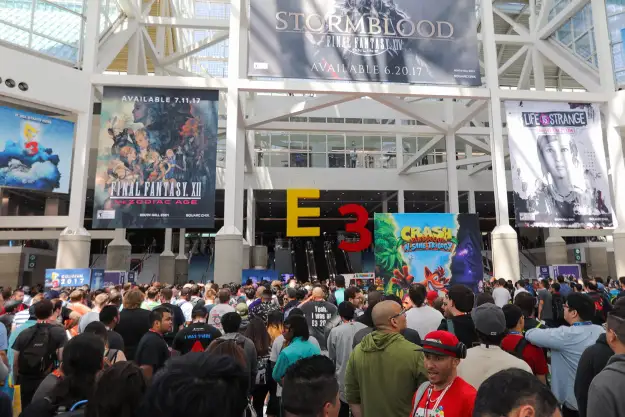
If Activision’s remake of GoldenEye 007 represents the ultimate nostalgic indulgence – a near one-to-one copy of an original as much for the sake of reviving memories as much for creating new ones – the latest XCOM represents the polar opposite – a sequel so far removed from the original that some fans may question whether it really deserves the name.

Put both games on a Venn diagram, and it’s not looking good for that convergence of circles in the middle. So,with game type and time period shifted, what sliver of commonality does XCOM even share with the original, hyphenated game?
Fear. According to 2K developers, the original X-COM was about terror, the fear of not knowing what’s around the corner, and what you can’t see. In the latest version, they’ve tried to preserve that sense of the unknown, from creepy, abandoned locales to aliens of unknown strength, speed and abilities.
Retelling the Origins of XCOM
The demo shown at E3 starts off in a hangar loaded with crates, bustling with fedora-topped characters and chrome-gilded vehicles that wouldn’t look out of place on the set of The Godfather. You wouldn’t know it, but this XCOM headquarters.

A quick stroll through the compound reveals a maze of interior rooms buzzing with chain-smoking staffers, each one monitoring for alien activity that gets plastered up a giant map in the war room. From here, the game derives much of its strategic bent. With only limited resources, you’ll need to choose wisely which throbbing icons on the map you respond to. While a trip to Tennessee might net more of the precious alien resource Elerium, civilians in California could die as you’re off poking around for downed UFOs.
In another room, a sort of lab-cum-armory, the XCOM equivalent of Q uses research gleaned from the field to cook up new weapons based on alien technology. In the demo, he’s just finished what looks mysteriously like an otherworldly Molotov cocktail, a glass orb filled with inky liquid, which erupts into flame when you hurl it into the ground.
Back in the war room, a bloodcurdling emergency call from a woman in California sets off the first mission.
Alien Warfare
The idyllic suburban neighborhood the response team pulls up to matches the eerie feel of the original XCOM terrain. Like the original XCOM, the environment is as disturbing for what you don’t see as what you do see. It’s a fairly pedestrian locale, but utterly devoid of people. Clues like a baseball cap and bat surrounded by a sticky black goo tell you they probably didn’t leave peacefully.
Carter and a handful of his crew show up in a sedan sporting the latest in alien-slaughtering technology: pump shotguns. Carter, at least, also has a sack full of Molotov orbs and a lightning gun.

Seconds later, they spot the intruder: an amorphous black blob that slithers around the neighborhood attacking people. Shooting it seems ineffective at first, but eventually seems to scatter enough goo to reveal a blue core, which lets out of puff of gas after the final mortal shot. Except it turns out there’s a whole infestation of them terrorizing a household.
Claims of strategy aside, combat looks a lot like what you might find in any other FPS: Carter and company strafe around the blobs pumping them full of buckshot, hucking grenades, and trying to keep terrified civilians from getting eaten alive. The cries of civilians lead the party from one part of the house to the next as they try to fend off the blobs. Like the original, the maps feel nonlinear and open to different forms of combat. An open door to the basement hinted that the fight could have tumbled down the stairs, but it never went there.
After likely demolishing the entire house twice over, but saving everyone who was alive when they showed up, the field agents chalk it up to a win and move outside.
Where an electrical storm outside starts sucking up everything around it, then turns into a shape-shifting whirl of shapes. This is bad. Carter and his field agents run for the car as the screen turns white.
Closer to the Action, Still Scary
I can still remember playing X-COM as a kid, then retiring to bed convinced that the lights of passing cars were alien landing craft ready to touch down and abduct my entire family. Even with a change of time period and game style, I can still see the new XCOM bringing about the same unnerving sense of fear and more than a few leap-out-of-your-skin-when-playing-at-3am moments. Strict turn-based fans may not be happy to see aliens from a first-person viewpoint and combat not powered by “action points,” but 2K appears to actually understand the intellectual property, and we can’t wait to see what they’ll do with it.
Warning: This trailer may not be suitable for all ages.
Editors' Recommendations
- TopSpin 2K25 serves up a fun, but safe tennis simulation revival
- Wrestlemania XL weekend already has its first champion thanks to WWE 2K24
- Embracer Group finally sells Gearbox Software, but keeps Gearbox Publishing
- WWE 2K24 makes one small change that goes a very long way
- WWE 2K24 lets you recreate Wrestlemania’s most iconic matches this March


